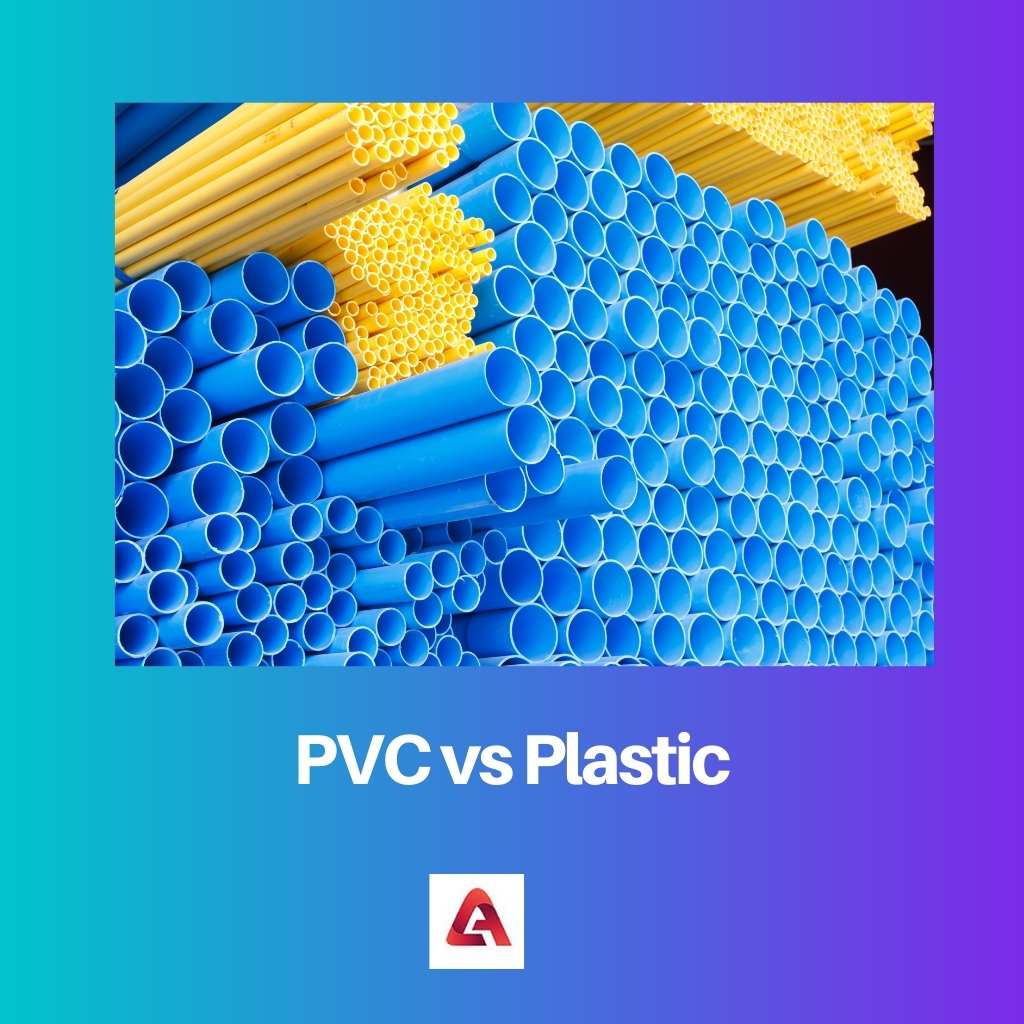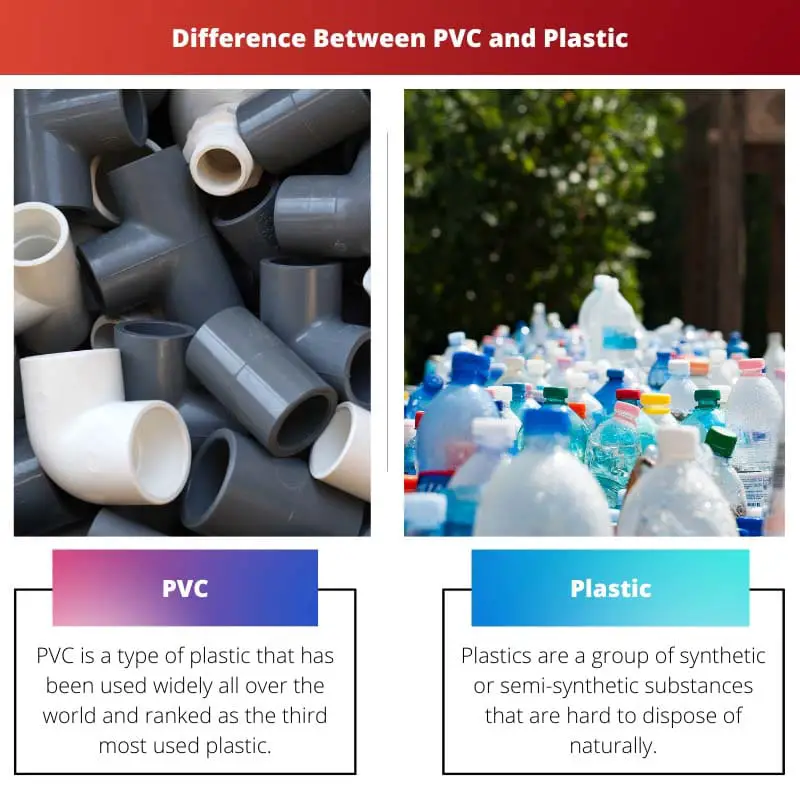Around the world, we use different types of plastic every day in our lives. Plastic is quite harmful to the environment in terms of disposal and not all plastics are recyclable.
However, the use of plastic has made our lives easier. PVC is also a type of plastic. PVC shares many properties of plastics but also varies in some parameters.
Key Takeaways
- PVC, or polyvinyl chloride, is a specific type of plastic, whereas plastic is a broad term encompassing various synthetic or semi-synthetic materials made from polymers.
- PVC is known for its durability, low cost, and resistance to water and chemicals, while other plastics possess a wide range of properties and applications.
- PVC is commonly used in construction, plumbing, and electrical applications, while other plastics have diverse uses, including packaging, automotive, and consumer goods.
PVC vs Plastic
Plastic is a wide range of synthetic or semi-synthetic materials made from polymers, which are long chains of molecules. PVC is a type of plastic that is made from vinyl chloride monomer with a wide range of applications because it is lightweight, durable, and resistant to liquid.

PVC is one of the most popularly used plastics in the world. There are two types of PVC that are in the form of rigid and flexible. The type of plastic that is used depends on the purpose.
The rigid form of PVC is commonly used for construction or pipelines purposes. The flexible form of PVC is commonly used for bottles, electronic cables, etc.
Plastic is a group of synthetic materials that are hard to dispose of naturally but serve numerous purposes and make the lives of humans on earth easier.
Even though the disposal of plastics is harmful to the environment, their use in our everyday lives is inestimable. Most of the product that we use is consumed in plastic at least a little.
Comparison Table
| Parameters of Comparison | PVC | Plastic |
|---|---|---|
| Meaning | PVC is a polyvinyl chloride discovered in 1872 by German chemist Eugen. | Plastics are a group of synthetics or semi-synthetics materials discovered in 1907. |
| Electrical properties | PVC has better insulation properties in comparison to plastic. | Comparatively, plastic has fewer insulation properties. |
| Hardness | PVC is harder and stronger than plastic as it has mechanical strength. | Plastic is comparatively less hard and strong in comparison to PVC. |
| Chemical resistant | PVC is more resistant to chemicals like acids. | Plastic in general is less resistant to chemicals. |
| Scope | PVC is a narrower term in comparison to plastic. | Plastic is a wider term in comparison to PVC. |
What is PVC?
PVC is a type of plastic that has been used widely all over the world and ranked as the third most used plastic.
PVC is polyvinyl chloride or a group of synthetic polymers of plastic. It was discovered in 1872 by Eugen Baumann, a German chemist.
PVC is highly in demand all over the world as it has numerous uses and is used to make many products in our everyday lives.
PVC is produced by the polymerization of the vinyl chloride monomer. Polymerization is the process of combining monomer molecules to form polymer chains.
Once the polymerization is over, the production of PVC will be considered almost over. However, after polymerization, the PVC undergoes a process of emulsion where it acquires the plastic form.
PVC is available in wide varieties and colors as well. The PVC is available in two forms that are rigid and flexible.
The rigid form of PVC will have more uses like construction of pipelines, electrical insulation, etc whereas the flexible form of PVC has fewer uses in comparison to the rigid form and is commonly used for the manufacture of plastic bottles.
Hence, PVC is really useful in making our lives easier but however, the disposal of such plastics must be done in a safer and cautious way.

What is Plastic?
Plastics are a group of synthetic or semi-synthetic substances that are hard to dispose of naturally. The plastic was discovered in 1907 by a Belgian chemist and brilliant marketeer Leo Baekeland.
Despite the harm involved in the disposal or burning of plastics, people all over the world used plastics in the production of many products as it made their lives effortless.
There are wide varieties of plastics that are used for numerous purposes. The word plastic is derived from the Greek word “plastikos” which means a substance capable of being shaped.
Plastics are made by the polymer of chains through the process of polymerization. Plastics are formed by the molecules of monomers. Hence, they are stronger and have good insulation for electrical instruments.
Plastics are classified into three types depending on their area of application. These are a commodity, engineering, and high-performance plastics.
However, the reason why the usage of plastics is restricted by many countries is the harmful substance that is released during the burning of plastics or disposal of plastics.
Hence, plastics are extremely useful in our everyday lives and their usage must also be restricted for a safer environment. Newer ways of disposal of plastics must be found to get full advantage of plastics.

Main Differences Between PVC and Plastic
- PVC is a narrow term while plastic is a wider term and the term plastics includes various types. PVC is one of the most popularly used plastic.
- PVC is expensive as their production is limited and their uses are vast while plastics are common and are cheaper in the market.
- PVC is a chemical-resistant substance in comparison to the other plastics in the market.
- PVC is hard and has high mechanical strength in comparison to plastic.
- Disposal of PVC is more harmful to the environment in comparison to the disposal of plastic as recycling and reusing PVC is not possible.

- https://books.google.com/books?hl=en&lr=&id=u_1ePU4GEGAC&oi=fnd&pg=PR9&dq=plastic&ots=N7y8r840g7&sig=6dYpB_U_eo5KLeESvGqpM2mKGok
- https://books.google.com/books?hl=en&lr=&id=aYPtCAAAQBAJ&oi=fnd&pg=PR29&dq=PVC&ots=WdAA7j3OGi&sig=2p_9ms65K4fW495zIm8VOjWCr1M
